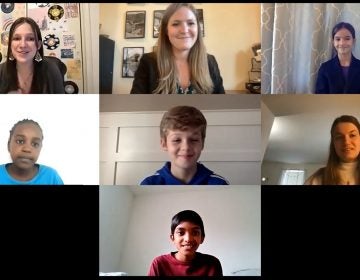Delaware schools partner with University of Delaware to improve K–3 literacy rates, addressing critical ‘blind spots’
Seventy-five percent of fourth-graders in the state lack reading proficiency. Research begins next month to deliver findings within three years.
Listen 1:35
Children learning to read at school. (pressmaster/BigStock)
From Philly and the Pa. suburbs to South Jersey and Delaware, what would you like WHYY News to cover? Let us know!
Delaware’s troubling 45th ranking in literacy rates underscores a nationwide issue, according to the Annie E. Casey Foundation’s 2024 Kid Count report.
The report shows alarming concerns, revealing that 75% of fourth-graders in the state lack reading proficiency. Additionally, it shows that 55% of children aged 3 or 4 are not enrolled in school, pointing to substantial gaps in access to early childhood education.
Despite recent efforts to improve its literacy rate with initiatives like the Imagination Library program and the Latino Family Literacy Project, Delaware still faces significant challenges.
What is the state’s next step to address this issue?
Following two years of preparation and relationship building, the University of Delaware’s College of Education and Human Development, Partnership for Public Education and Collaborative for Data-Driven Action will work with the Delaware Department of Education to boost literacy and ensure fair learning opportunities statewide.
“We call it DELRPP, which is in Delaware Early Literacy Research Practice Partnership,” said Monica Gant, associate secretary of the academics support team for the DDOE. “We believe this partnership will build our capacity as a state agency to better understand the available data, use that data to make informed decisions and then create systems that will expand beyond the partnership.”
This pioneering research initiative is the first of its kind and aims to uncover “blind spots” that educators may have overlooked during the most critical years of child development.
“While we look at the work that’s happening in our schools and the various amounts of data that we have across the state, this will help us to pinpoint what’s happening with students in the K-2 realm,” added Kathy Kelly, the director of curriculum instruction and professional development. “Which serves as a blind spot for us sometimes so this would really help us identify those potential blind spots and where we can provide more support.”
Leading the project is Anastasia Purinton, the associate director of the Partnership for Public Education at the University of Delaware. She explains that the project will analyze kindergarten-through-third-grade literacy outcomes in the state, along with administrative data on children, teachers and schools, taking a different approach from the typical traditional research model.
“There’s a ton of data collected about children’s literacy outcomes,” Purinton said. “There are National assessments like the NAEP, which is the national assessment of educational progress. There are state assessments, but then schools themselves collect a lot of assessment data as well, like benchmark and diagnostic data.”
“One of the really exciting opportunities that this project presents is a chance to look at all of that information together,” she added.
Researchers and leaders at the Delaware Department of Education have convened to discuss the goals and priorities of this project.
Here are Purinton’s takes on the four priorities they aim to address:
- “Help build a statewide integrated data set and a comment metric that’s going to help capture K-3 early literacy assessment data.”
- “Learn more about the factors influencing equal early literacy outcomes and identify students strengths and needs in early childhood literacy achievement in Delaware.”
- “Understand more about how educators are using assessment data to inform and adapt their instructional practices.”
- “Think about ways to strengthen and align policy and assessment and instruction with state literacy standards across schools and districts in order to reduce inequality in early literacy outcomes.”
Supported by a $650,000 grant from the W.T. Grant Foundation and additional University of Delaware funds, research is set to launch next month. The objective is to deliver findings within three years, with ongoing support anticipated.

Get daily updates from WHYY News!
WHYY is your source for fact-based, in-depth journalism and information. As a nonprofit organization, we rely on financial support from readers like you. Please give today.






